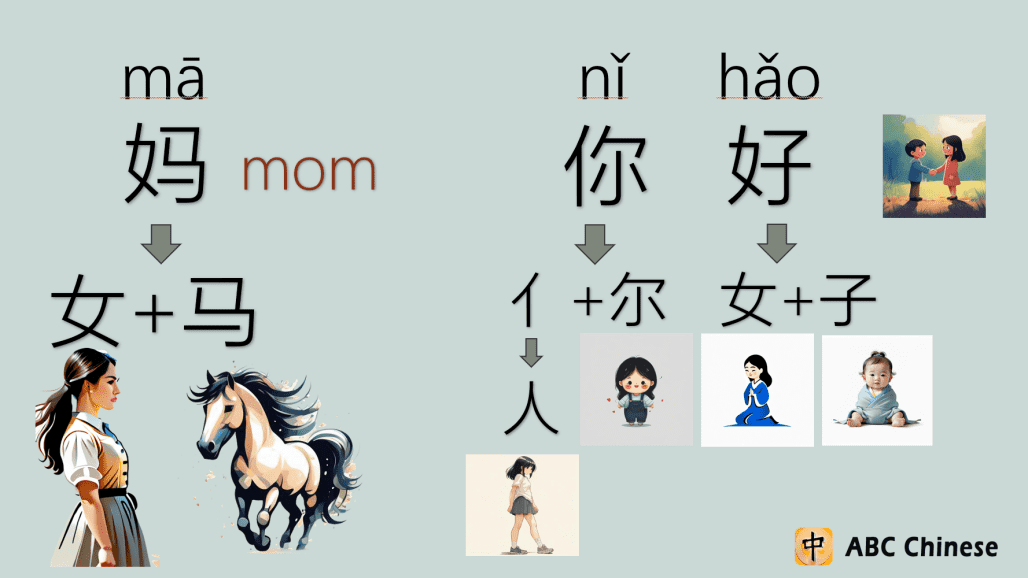Commonly Used mandarin

I. Commonly Used Basic Phrases for Foreigners in China
For foreigners who have just arrived in China, mastering some basic phrases can make their lives much more convenient. The following are common basic greetings, phrases for asking for help, etc. in Chinese, along with their corresponding English translations and example sentences.
(1) Greetings
1. 你好 (nǐ hǎo) - Hello
Example: 你好,我是来自美国的汤姆。 (Hello, I'm Tom from the United States.)
2. 早上好 (zǎo shàng hǎo) - Good morning
Example: 早上好,今天天气真不错。 (Good morning. It's a really nice day today.)
3. 下午好 (xià wǔ hǎo) - Good afternoon
Example: 下午好,您知道附近的银行在哪里吗? (Good afternoon. Do you know where the nearby bank is?)
4. 晚上好 (wǎn shàng hǎo) - Good evening
Example: 晚上好,我们一起去吃晚餐吧。 (Good evening. Let's go to have dinner together.)
5. 再见 (zài jiàn) - Goodbye
Example: 再见,希望很快能再见到你。 (Goodbye. Hope to see you again soon.)
(2) Expressions of Thanks and Apologies
1. 谢谢 (xiè xie) - Thank you
Example: 谢谢,你帮了我一个大忙。 (Thank you. You've helped me a great deal.)
2. 不客气 (bù kè qì) - You're welcome
Example: A: 谢谢你的帮助。 B: 不客气。 (A: Thank you for your help. B: You're welcome.)
3. 对不起 (duì bu qǐ) - Sorry
Example: 对不起,我不小心撞到你了。 (Sorry, I bumped into you accidentally.)
4. 没关系 (méi guān xi) - It doesn't matter
Example: A: 我迟到了,对不起。 B: 没关系,我们开始吧。 (A: I'm late. Sorry. B: It doesn't matter. Let's start.)
(3) Communication and Understanding
1. 我不明白 (wǒ bù míng bái) - I don't understand
Example: 你说的太快了,我不明白。 (You're speaking too fast. I don't understand.)
2. 请说慢一点 (qǐng shuō màn yī diǎn) - Please speak a little slower
Example: 我跟不上你的速度,请说慢一点。 (I can't keep up with you. Please speak a little slower.)
(4) Shopping
1. 这个多少钱 (zhè gè duō shǎo qián) - How much is this?
Example: 这个纪念品多少钱? (How much is this souvenir?)
2. 太贵了 (tài guì le) - It's too expensive
Example: 这个包包太贵了,有便宜一点的吗? (This bag is too expensive. Do you if you have a cheaper one?)
3. 便宜一点 (pián yi yī diǎn) - A little cheaper
Example: 我觉得这个价格太高了,可以便宜一点吗? (I think the price is too high. Can it be a little cheaper?)
4. 我要这个 (wǒ yào zhè gè) - I'll take this one
Example: 这个杯子很漂亮,我要这个。 (This cup is very beautiful. I'll take this one.)
(5) Asking for Directions and Seeking Help
1. 在哪里 (zài nǎ lǐ) - Where is...?
Example: 地铁站在哪里? (Where is the subway station?)
2. 我迷路了 (wǒ mí lù le) - I'm lost
Example: 我迷路了,你能帮我吗? (I'm lost. Can you help me?)
3. 救命 (jiù mìng) - Help
Example: 救命!有人落水了。 (Help! Someone has fallen into the water.)
4. 洗手间在哪里 (xǐ shǒu jiān zài nǎ lǐ) - Where is the washroom?
Example: 不好意思,洗手间在哪里? (Excuse me. Where is the washroom?)
5. 我需要帮助 (wǒ xū yào bāng zhù) - I need help
Example: 我遇到了一些麻烦,我需要帮助。 (I've got some trouble. I need help.)
(6) Eating and Drinking
1. 我饿了 (wǒ è le) - I'm hungry
Example: 走了这么久,我饿了。 (After walking for so long, I'm hungry.)
2. 我渴了 (wǒ kě le) - I'm thirsty
Example: 天气太热了,我渴了。 (It's too hot. I'm thirsty.)
3. 有菜单吗 (yǒu cài dān ma) - Do you have a menu?
Example: 服务员,有菜单吗? (Waiter, do you have a menu?)
4. 我吃素 (wǒ chī sù) - I'm a vegetarian
Example: 我吃素,请给我推荐一些素菜。 (I'm a vegetarian. Please recommend some vegetarian dishes for me.)
5. 好吃 (hǎo chī) - It's delicious
Example: 这个中国菜好吃。 (This Chinese dish is delicious.)
6. 不好吃 (bù hǎo chī) - It's not delicious
Example: 这个味道很奇怪,不好吃。 (This taste is very strange. It's not delicious.)
(7) Expressing Likes and Dislikes
1. 我喜欢 (wǒ xǐ huān) - I like...
Example: 我喜欢中国的传统文化。 (I like Chinese traditional culture.)
2. 我不喜欢 (wǒ bù xǐ huān) - I don't like...
Example: 我不喜欢吃辣的食物。 (I don't like spicy food.)
(8) Asking about Things
1. 这是什么 (zhè shì shén me) - What's this?
Example: 这是什么东西?我从来没见过。 (What's this? I've never seen it before.)
2. 那是什么 (nà shì shén me) - What's that?
Example: 看,那是什么?在天空中飞着呢。 (Look. What's that? It's flying in the sky.)
(9) Self-introduction and Inquiries
1. 我的名字是 (wǒ de míng zì shì) - My name is...
Example: 我的名字是大卫,很高兴认识你。 (My name is David. Nice to meet you.)
2. 你叫什么名字 (nǐ jiào shén me míng zì) - What's your name?
Example: 你好,你叫什么名字? (Hello. What's your name?)
3. 我来自 (wǒ lái zì) - I'm from...
Example: 我来自英国。 (I'm from the UK.)
4. 你来自哪里 (nǐ lái zì nǎ lǐ) - Where are you from?
Example: 你来自哪里?你的口音很有趣。 (Where are you from? Your 口音 is very interesting.)
5. 很高兴认识你 (hěn gāo xìng rèn shí nǐ) - Nice to meet you
Example: 很高兴认识你,希望我们能成为朋友。 (Nice to meet you. I hope we can be friends.)
(10) Identity and Tourism-related
1. 我是游客 (wǒ shì yóu kè) - I'm a tourist
Example: 我是游客,对这里不太熟悉。 (I'm a tourist. I'm not very familiar with this place.)
2. 有什么好玩的地方 (yǒu shén me hǎo wán de dì fang) - Are there any interesting places?
Example: 这里有什么好玩的地方吗? (Are there any interesting places here?)
3. 我可以拍照吗 (wǒ kě yǐ pāi zhào ma) - Can I take a picture?
Example: 这座建筑很漂亮,我可以拍照吗? (This building is very beautiful. Can I take a picture?)
(11) Physical Condition and Rest
1. 我累了 (wǒ lèi le) - I'm tired
Example: 走了一整天,我累了。 (After walking all day, I'm tired.)
2. 我想休息一下 (wǒ xiǎng xiū xi yī xià) - I want to take a rest
Example: 我现在感觉不太舒服,我想休息一下。 (I don't feel very well now. I want to take a rest.)
(12) Accommodation-related
1. 附近有酒店吗 (fù jìn yǒu jiǔ diàn ma) - Is there a hotel near here?
Example: 我刚到这个城市,附近有酒店吗? (I just arrived in this city. Is there a hotel near here?)
(13) Language and Permission
1. 你会说英语吗 (nǐ huì shuō yīng yǔ ma) - Do you speak English?
Example: 你好,你会说英语吗?我有一些问题想咨询。 (Hello. Do you speak English? I have some questions to ask.)
2. 请 (qǐng) - Please
Example: 请给我一杯水。 (Please give 我 a glass of water.)
3. 可以 (kě yǐ) - OK / Can
Example: 我可以坐在这里吗? (Can I sit here?)
4. 不可以 (bù kě yǐ) - No / Can't
Example: 这里不可以吸烟。 (Smoking is not allowed here.)
(14) Time-related
1. 等一下 (děng yī xià) - Wait a moment
Example: 等一下,我还没准备好呢。 (Wait a moment. I'm not ready yet.)
2. 快点 (kuài diǎn) - Hurry up
Example: 快点,我们要赶不上火车了。 (Hurry up. We're going to miss the train.)
3. 今天几号 (jīn tiān jǐ hào) - What's the date today?
Example: 你好,今天几号了? (Hello. What's the date today?)
4. 现在几点 (xiàn zài jǐ diǎn) - What's the time now?
Example: 打扰一下,现在几点了? (Excuse me. What's the time now?)
(15) Reservation-related
1. 我有预约 (wǒ yǒu yù yuē) - I have a reservation
Example: 我有预约,我的名字是约翰。 (I have a reservation. My name is John.)
II. English Translations of Characteristic Chinese Phrases
(1) Proverbs and Sayings
Chinese proverbs and sayings contain profound wisdom. Understanding their English translations can help foreigners better understand Chinese culture. For example, "有志者事竟成" (Where there's a will, there's a way.) and "患难见真情" (A friend in need is a friend indeed.). These proverbs and sayings convey Chinese values and life philosophies in a concise and vivid way.
(2) Expressions of Ability and Habit
There are some unique Chinese phrases to express personal abilities and habits. For example, "海量" (a large capacity for liquor) is often used to describe a person who can drink a lot; "有头脑" (intelligent and resourceful) means a person is smart and resourceful. These phrases enrich the ways of expression in language and show the subtlety of the Chinese language.
III. Commonly Used Phrases in Specific Scenarios
(1) Tourism Scenario
Foreign tourists in China will use many specific Chinese phrases when traveling. When visiting scenic spots, they may ask "这里有什么特色景点? (What are the special scenic spots here?)" or "怎么去山顶? (How can I get to the top of the mountain?)". When taking transportation, they may say "去机场多少钱? (How much is it to the airport?)" or "下一站是哪里? (What's the next stop?)".
(2) Work Scenario
For foreigners working in China, Chinese phrases related to work are essential. For example, "我有个会议 (wǒ yǒu gè huì yì) - I have a meeting.", "截止日期是什么时候? (What's the deadline?)", "我完成任务了 (wǒ wán chéng rèn wu le) - I have completed the task." These phrases help them communicate effectively with colleagues and superiors at work.
(3) Daily Life Scenario
In daily life, there are also corresponding commonly used phrases in aspects such as shopping, dining, and socializing. Besides the price inquiry phrases mentioned earlier when shopping, they may also say "有折扣吗? (Is there a discount?)"; when dining, they may say "我想点外卖 (wǒ xiǎng diǎn wài mài) - I want to order takeout."; in social occasions, they may say "你有空吗? (Are you free?)". These phrases enable foreigners to better integrate into the daily life in China.
IV. How to Remember These Phrases
The Ebbinghaus Forgetting Curve
In the process of learning a language, forgetting is an inevitable challenge. The ABC Chinese app cleverly applies the principles of the Ebbinghaus Forgetting Curve. When foreigners are learning Chinese phrases, the content they have learned will appear regularly in subsequent learning sessions. Through this regular review method, the memory effect can be greatly enhanced, truly enabling foreigners to remember Chinese.
According to research, reviewing in accordance with the Ebbinghaus Forgetting Curve can increase the retention rate of memory to over 80%. This means that when foreigners use the ABC Chinese app to learn Chinese phrases, they have a great chance of firmly remembering these phrases, thus being able to use them more freely in real life.
Speak More and Practice More
Mastering a language is inseparable from practical application, and the same is true for remembering Chinese phrases. Foreigners can find Chinese people to practice with and continuously reinforce the learned phrases in real communication scenarios. Meanwhile, the AI Chinese teacher in the ABC Chinese app also provides them with an excellent practice platform. In multiple simulated life scenarios, foreigners can have conversation practice with the AI. This immersive language environment enables them to quickly master Chinese Mandarin phrases and grammar.
When foreigners don't know how to communicate with the AI in Chinese, they can click the hint button, and the AI will tell them what to say. Just like living in China, this way allows them to quickly master Chinese skills. Currently, the ABC Chinese app supports multiple languages such as English, Japanese, Korean, Spanish, Indonesian, French, German, Italian, and Malay. Even if foreigners don't know Chinese, they can still have a conversation with the AI in their native languages and receive Chinese responses.
For example, a tourist from France can communicate with the AI in French and learn Chinese phrases during the communication process. Through continuous practice, he can master travel-related phrases such as "Excuse me, is this the way to...?" and "I'm lost." more proficiently, making his trip to China smoother.
In conclusion, by taking advantage of the regular review based on the Ebbinghaus Forgetting Curve and the approach of speaking more and practicing more, foreigners can better remember these commonly used Chinese phrases, laying a solid foundation for their life, work, and cultural exchanges in China.



